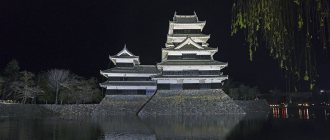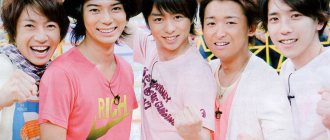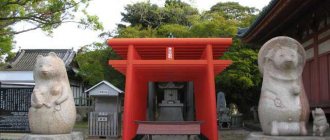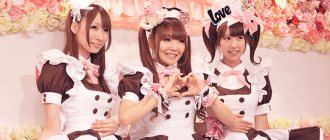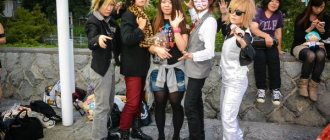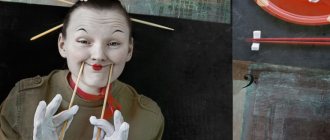This is not Russia, where you can go to a restaurant and sing a couple of songs in front of a small TV in front of everyone. This is Japan - the birthplace of karaoke. “Kara” comes from the word karappo (空っぽ)—empty, free, and “oke” comes from the word okesutora (オーケストラ)—orchestra. Karaoke is VERY common in Japan. In terms of technology that surpasses even toilet seats, karaoke has a whole list of different methods and functions to enhance and enliven your singing. Warm up your vocal cords and let's find out what's so special about Japanese karaoke!
Where it all started
Singing to pre-recorded music began in the late 60s and 70s when new technology made it possible to store recorded audio, making it easier for traveling musicians to use. However, the karaoke machine was invented in 1971 by a Japanese musician from Kobe, Daisuke Inoue. Clarion then started producing these machines due to lack of patent.
In Japan, it has historically been common to dine with musical accompaniment . At the coffee shop where Inoue worked, guests often asked for recordings of his songs so they could sing along too. A businessman by nature, Inoue made a recording machine that played his songs in exchange for payment.
He then began renting out his cars to shops. Karaoke machines began to appear in restaurants and hotel rooms. It didn't take long before there were specific establishments with private party rooms with karaoke machines. The rest is history!
History of karaoke
Daisuke Inoue. Drummer. Early 1960s.
I had to hide the fact that I was a drummer. In Japan in the 1950s, schoolchildren were prohibited from working part-time. And today they look askance at this. A short haircut would instantly give me away, so I grew my hair a couple of centimeters, which led to me being considered a nonconformist at school. I played in cabaret almost every evening and grew a lot as a musician over the year. I often fell asleep in class, but I never skipped school in three years. One way or another, I managed to finish my studies. After eight unhappy months at the firm—I was the only businessman with long hair, bell-bottoms, a floral shirt, and platform boots—I told my parents I was leaving home to become a drummer. The father, oddly enough, said: “Come on. Good luck". The path turned out to be thorny. In the cabaret I earned four times more than in the company, but the money ran out very quickly. Japan has an interesting philosophy: your elders always take half of your earnings. In addition, in my company there were drinking and parties every evening. One evening I realized that no matter how much I practice, I will never be able to compare with people who are talented from God. This thought was enough to change my life. After spending 9 years on the road, leaving many adventures behind and no regrets, I returned home. I was 28 years old.
At that time, the habit of singing in taverns to live music spread among the residents of Kobe. There wasn't room for drums in those places, so I started practicing on the synthesizer and learned 300 songs. I continued to learn new things, trying not to forget the old, but the computer installed in my brain was made in 1940, and the space in it was limited. I started to get confused and sometimes play completely wrong.
One day, the president of a small company came to the club where I worked and asked me for a favor. He was on his way to negotiate with a client. The meeting would probably end up in some bar somewhere, and he would probably be asked to sing: “Daisuke, the only music I can sing to is the one you play on your synthesizer. You know what to do to make my voice sound good.”
I recorded a couple of songs on a tape recorder in the keys that suited him best. A couple of days later, an acquaintance returned, beaming, and asked if I could record more songs. And then it dawned on me: you throw money into a machine with a microphone, a speaker and an amplifier, and it plays what you want to sing.
The school I graduated from had a specialization in electrical engineering. So one could assume that I assembled the first machine gun myself. But I was always wildly afraid of electricity, and I never really learned anything at school. An acquaintance owned an electronics store, and he assembled eleven Juke 8 machines based on my descriptions. Each consisted of an amplifier, a microphone, a coin acceptor and an eight-track radio. It took about two months and cost about $425 per device.
Now we needed songs. The first recordings were made by my group, but they soon forbade me to play. In just a year we recorded and mixed 300 songs. Around the fourth year, money started flowing to us. I hired a real ensemble, twenty musicians, and rented a professional studio.
I myself sang karaoke for the first time in 1969. Then it seemed to me that no one would be interested in this except me. But in 1971, the machine made a splash on the market. If I had lived anywhere else, nothing would have worked out. In Tokyo and Osaka, people listened to live music or jukeboxes imported from America. And in Kobe, people got drunk and sang themselves - accompanied by a live ensemble, a guitar or some kind of keys.
I placed ten machines in my friends’ clubs, but when I toured them a week later, it was the same everywhere: visitors asked what kind of things were in the corner, but no one touched them. There was no money in any of the cars.
Then I asked one of my friends to work as a bait: go to several clubs and sing a couple of songs to the Juke 8. I thought a cute, sexy girl would attract attention. And it worked. The cars instantly turned into a gold mine. The machines were set up in such a way that for a hundred yen - at that time about a third of a dollar - they played for five minutes. The average song lasted three minutes, and to finish the second song, you had to add another hundred. It worked like modern prepaid cards.
A year later, my cars were in two hundred drinking establishments in Kobe. And then something important happened. Two people from Kobe decided to open clubs in Osaka and took the Juke 8 there. A year later we were sending the cars all over Japan. They produced 25 thousand pieces. They were all painted white and looked like slot machines. After Osaka, the machine guns took over Tokyo, and soon the entire country, continent, and then the world were gripped by the epidemic.
When I made the first Juke 8 machines, my brother-in-law advised me to file a patent. But then I didn’t think anything would come of it. I think karaoke wouldn't have taken off this way if the first machine had been patented. Not to mention I didn't come up with the whole thing from scratch. I only owned the business model. The amplifier, microphone, even the coin acceptor - all this has already been patented. I didn’t even come up with the word “karaoke”. In 1952, the famous Takarazuka Kageki troupe gave concerts every evening in Osaka. They performed with an orchestra that once went on strike. The parent company did not want to make concessions, but it could not find a replacement. Then she ordered a machine from Matsuda Electronics that could play instead of an orchestra. They say that someone from Matsuda then said: “The music is playing, but the orchestra pit is empty!” In Japanese, the phrase "empty orchestra" sounds like "kara okesutura", which when abbreviated became "karaoke".
I had a hard time persuading the largest companies to sign contracts under which the songs of their artists could be included in collections and libraries for Juke 8. Now absolutely everyone wants to get into the karaoke databases. Many Japanese singers and composers, even those who have only one hit, live on royalties from the performance of this very single song. In Japan, billions of dollars are earned annually from karaoke.
After laser discs appeared and my company stopped producing karaoke devices, I started trading. I had a well-developed distribution network, so soon we were selling $100 million worth of machines a year. After some time, music began to be distributed through mail or telephone lines. The songs were sent directly to companies or drinking establishments. There was no need to go anywhere or maintain contacts anymore. I could relax, do nothing and get half a million every year. I had everything except business. And then I began to feel terrible depression. I handed the company over to my brother and left.
My dog Donbei brought back my love for life and inventions. I'm pleased to know that karaoke has done the same for many. The 1970s were not a good time in Japan. Companies went bankrupt and people lost their jobs. Many businessmen committed suicide. In 1971, there were 35 thousand suicide cases in Japan. That same year, we began supplying karaoke machines throughout the country. And as karaoke took over Kobe, Osaka, Tokyo and, finally, all of Japan, it seemed that people began to enjoy life more and more and more easily forget the troubles that had befallen them.
I have heard many times about people who suffered from nervous disorders until karaoke came along. I have received many letters describing how karaoke machines installed in hospitals and rehabilitation centers have helped patients recover. A close friend of mine cured himself from depression by singing karaoke. Even today, karaoke can be found in many clinics (I think doctors and doctors use them too).
In 1999, Time magazine included me in its list of twenty people who most influenced the 20th century. I was shocked. They said that thanks to Gandhi, people began to live their days differently, and thanks to me, their nights. Can you imagine your achievement being mentioned in the same breath as Gandhi? And in 2004, I received a letter from Harvard: it turned out that I had been awarded the Ignobel Peace Prize for having invented a device that teaches us all to come to terms with the monstrous singing of ordinary people and even enjoy it.
What have I done since I invented the karaoke machine? A very simple invention was a personal karaoke album, which had sections for the whole family's favorite songs, including pets. The book was a bestseller - and so I patented it! I also made a repellent to get rid of the bugs that would get into karaoke machines and eat the wires. This was also a hit. Now I live on top of a mountain in Kobe with my wife, daughter, her three daughters and eight dogs. Every evening I bathe my three granddaughters, we sing songs and splash ourselves with water. And once a week we take out karaoke albums and compete to see who can sing the most songs without becoming hoarse. For me, this is a way to pay tribute to karaoke and pass on the tradition to the next generations. I may not have a patent—some say I would make $80 million in one bad year—but I have beloved friends and family, and no matter what happens, I smile every day.
Fun night on the town
So how does it work? What is a karaoke night like in Japan?
First of all, karaoke in Japan is not just late-night entertainment for adults with alcohol. In fact, karaoke has always been very popular among children in Japan, starting in elementary school. Children, especially high school students, rent separate rooms with karaoke and spend hours there, and sometimes the whole day, talking and singing songs. People of all ages enjoy this pastime!
For adults, a karaoke night can often start at a restaurant or izakaya (居酒屋), where you can have a good meal, drinks and socialize with people. When the bill is paid, they often offer to go to the second round (二次会 nijikai) and usually everyone goes to karaoke.
Go to the registration desk and provide the necessary information: how many people are in your company, how long you want to sing. Order food or drinks (or nomihodai - unlimited drinks) and choose the type of karaoke player for your party. Some places offer higher quality players with a larger selection of songs that would normally be found in a catalog on a tablet or in hard copy. If you're lucky, you might even find different instruments in the room, such as tambourines and maracas, for a fun accompaniment.
There is a telephone in the room with which you can place an order. Food, drinks, extension of time or technical assistance, you can ask for all this without leaving the room!
Payment by time
Initially, karaoke was a device that played music recorded on a magnetic tape, to which they sang while looking at the words of the song printed on a card. Nowadays wireless microphones and television screens are used, where words appear against the background of thematic images. You can adjust the tone and speed of playback, add effects, such as echo, etc., and for training you can choose to play the original with the performer’s voice. Some devices can determine the quality of performance and give ratings, and in many karaoke you can use percussion instruments - tambourines, maracas - to additionally accompany the singing. Typically pay is hourly; By paying for one hour and one drink, you can sing as many songs as you like.
Hourly prices may vary depending on the time - on weekdays during the daytime, when there are few visitors, prices are lower than on weekends or evening hours. There are also expensive karaoke machines for wealthy clients; Rooms come in a wide variety of sizes, and the service available varies from one karaoke place to another. Since many karaoke shops operate 24 hours a day, it is not uncommon for people to go there after parties to continue the fun, and some people who missed the last train spend the night there until the morning. For a fee you can order food and drinks, and in some places using the nomihodai
, when for a fixed fee during a certain time (usually an hour, an hour and a half or two) you can drink as many drinks as you like, so many modern karaoke are establishments where you can eat, drink, sing and dance.
Sing while looking at the screen where the lines of the song's lyrics appear
Tips and Tricks
While every karaoke establishment is a little different, the song ordering process is typically controlled by a pair of touchscreen controls . With them, you can search for songs by artist (歌手名 kashumei), song title (曲名 kyokumei), or new songs (新曲 shinkyoku). When you search for an artist or song, you will need to use the Hiragana keyboard to enter the song title. If you want to search for a song in English, then simply search for the 英 symbol, which will switch the keyboard. The search button (探す sagasu) is usually located in the lower right corner, and vice versa, the return button (戻る modoru) is in the lower left corner.
For the more adventurous, there are options that allow you to change the key of the song. I can tell you from experience that both Japanese and foreigners will then (perhaps after a couple of drinks) just drone on for half the song, trying to find the right key. As a last resort, if you don’t like the song, look for the red button with the hieroglyph “stop”. Sometimes it may be written as 停止 (teishi) or 止まる (tomaru). Also, don't forget to check the volume before the first song! A blow to your eardrums can ruin your mood from the start.
Like hot springs, temples, and food, karaoke in Japan is a fun aspect of life that shouldn't be missed. Although you may feel shy at first, don't be afraid and just sing a few of your favorite songs. It won't be long before you'll be ordering songs one after another!
Our study trips to Japan will give you the opportunity to try karaoke with your friends and improve your singing skills. Contact us for more details!
Reasons why Japanese choose karaoke as a leisure activity
Next, we will talk about 5 beneficial properties of karaoke that make it so popular among Asians.
Relieves stress
In Japan, where even students can work 100 hours a week, karaoke has become one of the effective ways to relieve stress after a hard day. After all, scientists have long proven that when singing, the human body synthesizes joy hormones - endorphins. This has a beneficial effect on the nervous system, preventing stress from turning into physical illness.
Helps to unite the team
Karaoke is an effective way to unite the team and raise the morale of the team. In Japan, this fact is well known, which is why there, more often than in the West, it is customary to organize corporate events where the highlight of the evening is karaoke. Moreover, it is not customary to sit out at such parties. Everyone sings and dances there: from the secretary to the general director.
Improves intellectual abilities
Impaired cerebral circulation can lead to headaches, fatigue, memory problems and decreased reaction speed.
Singing karaoke raises a person's vitality, improves memory and develops attention. This gives strength for intense intellectual work at any age.
Gives you confidence
For those who are embarrassed to speak in public and have other difficulties with self-expression, singing karaoke is an excellent exercise for raising self-esteem. After regular vocal training, it is much easier to give a presentation and defend your opinion at a meeting, since singing removes inhibitions and strengthens a person’s inner core.
Improves health
Regular karaoke singing has a beneficial effect on human health. In particular:
- increases general immunity;
- improves posture and facial expressions;
- prevents lung diseases;
- treats mild forms of stuttering;
- helps cope with the consequences of a stroke;
- treats depression;
- prevents the development of senile dementia;
- improves coordination and much more.
Today there is a whole direction in official medicine - vocal therapy, which is based on the use of vocal practices for therapeutic and prophylactic purposes.
More information about online karaoke X-STAR
The X-STAR console comes complete with two wireless microphones, anti-rollers, a Bluetooth remote control, an audio receiver, the necessary cords and a power adapter. You can assemble and connect the set-top box in just five minutes.
The peculiarity of online karaoke is that the catalog of soundtracks is located in the cloud, access to which opens after activating the subscription. What’s important is that X-STAR gives each new user 90 days of free access to the service using a promotional code that is in the box with the set-top box.
Where in Russia you can sing karaoke
Today there are specialized karaoke bars and restaurants with a karaoke zone in most Russian cities, even with a population of up to 500 thousand people.
Many vocal lovers prefer home parties to club parties and buy a karaoke console for home. This allows them to sing without restrictions and queues for the microphone.
Modern home karaoke is not inferior to professional equipment in terms of sound quality and phonogram level. Moreover, such systems have their own features that open up unique opportunities for their owners.
One of these models is the online karaoke set-top box X-STAR. It implements all the capabilities of new generation karaoke and adds original developments.
